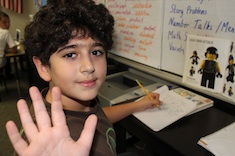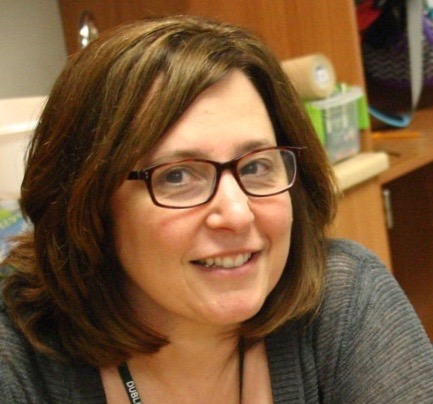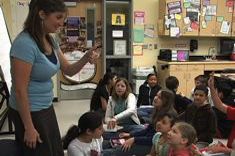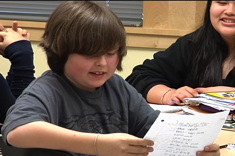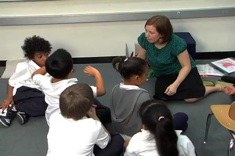This spring I had an observation scheduled by my assistant principal, Gabe Hoover, as part of our teacher evaluation process. I had asked him to come in during writing workshop because I had not been observed in writing workshop in a long time and felt like it was finally becoming the workshop I had visualized.
The day before the visit, the workshop was fabulous. Kids were busy working on independent work. I conferred with a few students and met with a group. All were reflective about their pieces and in the midst of making some great changes. One of our literacy coaches walked in that day and said the room was “magical.” I laughed but had trouble disagreeing. Sitting back and looking at all the writers busy working on projects of their choice in such an intentional way made my heart happy. I was eager for our new assistant principal to see our writing workshop in action.
Well, the day of my observation was one chaotic day in writing workshop. And believe me, it was not the good kind of chaos. Thinking back, this may have been the worst writing workshop that I’ve been part of in my 29-year teaching career. With my assistant principal in the room, I taught my fabulously planned minilesson and the kids went off to write. But that’s where the workshop fell apart. Most kids never actually settled into writing. While I met with one group, others giggled, whispered to each other, and sharpened pencils that didn’t need sharpening.
I thought about jumping in and doing some teacher-talk to get the kids back on track. I could have taken control and they would have complied, but that didn’t feel right, because I’d very seldom had to do that in a workshop. I reminded myself that if my bigger goals for writing workshop were authenticity, ownership, and independence, I couldn’t merely ask for compliance when things got difficult or just because there was a visitor in the room. I couldn’t sacrifice long-term goals because of a short-term crisis.
But here’s the thing. Writing workshop (and writing in general) is often like this.
No matter how long I’ve taught, writing workshop is hard almost every day. And even though I’ve been writing for a long time, writing is hard on most days. There are very few magical days as a writer.
It is easy to judge a classroom by a one-time event or visit. And it is easy to forget that these bad days are all part of the messy joy that is teaching. But we have to remember what Samantha Bennett says in her book That Workshop Book:
Learning is not about one great lesson or one great activity teachers design for students to do. It is about the little things teachers ask students to do every day like read, write, and talk that add up to the big things like making meaning from text and adding meaning to life.
Luckily Gabe understood that writing workshop wasn’t about one day. He was respectful enough during my post-observation conference not to pretend that the workshop was a good one. Instead, our meeting focused on my reflections. I explained that it was a very frustrating day as a teacher, but that days like that happen every so often in a writing workshop and I know they’re important to the whole of the workshop. I reflected on my bigger goals of wanting my kids to own their writing and to have experiences that are authentic as writers, including days when they just don’t feel like writing and do lots to avoid it. I reflected on my rationale for not jumping in and “fixing” the day.
If I had fixed the workshop because the assistant principal was in the room, I would have been doing it for the sole purpose of my evaluation and not based on the needs of my students. Instead I needed time to reflect and think about what was going wrong and what was causing the kids to be so disengaged in their writing. I shared my plan to have an honest conversation with them the next day as our writing minilesson—one that invited us to think as a community about hard writing days and how we could approach them differently. He stopped in later that week, during a “magical” moment and smiled.
My reflections helped me understand that my writing workshop is good for the most part—that I keep an eye on the bigger goals of authenticity, independence, and ownership as writers. But that doesn’t mean we don’t have bad days. The bad writing days give us the opportunity to teach our students about the real struggles writers have and how to work through them. We would not be able to have conversations about what writers do on days when they don’t feel like writing if we didn’t have days like this.
If we want authenticity, we have to let these real moments happen in our workshop. In all honesty, I would rather have these “real moments” kind of days when no visitors are in the room, when we can reflect as the close-knit writing community that we are. Luckily most of the messy days happen when I am not being observed or evaluated. But I’ve realized that regardless of who is in the room or the challenges we are facing in our workshop, my bigger goal is to support independent, empowered writers, not compliant, well-behaved writers. I learned to give myself some grace and to remember that the big picture of learning in our classroom is never about one day or one lesson or one moment in time.

